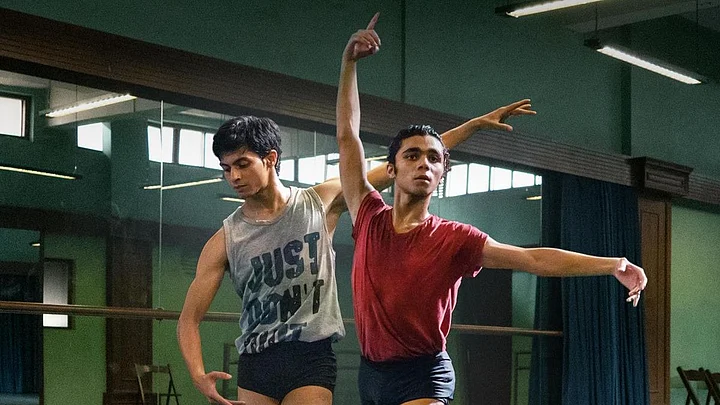As much as we’d like to think that art brings us all together, in a capitalistic world there are often barriers and gatekeepers. Not to forget the stigma around pursuing something in the arts as a career. A character in Netflix’s new film Yeh Ballet puts it bluntly, “Is this dancing going to put food on your table?”
Watch the trailer here:
Yeh Ballet has been directed by Sooni Taraporevala, who last helmed Little Zizou and has been a frequent collaborator with Mira Nair (The Namesake, Salaam Bombay!). The film is about two boys Nishu (Manish Chauhan) and Asif (Achintya Bose), who are from humble backgrounds and are discovered by a ballet teacher ( Julian Sands). It does follow the beats of an underdog story, and you know right at the beginning how the film is going to end. But Sooni is able to bring out the massive class divide when it comes to a dance form like ballet, which for years has been seen as ‘elite’.
Everything from religion to your family to the lack of money can be an impediment to pursuing something like dance, and particularly ballet. The art form is also gendered; there are very few men who chose to learn ballet. Nishu participates in dance competitions but hides that from his father, who is a taxi driver. Asif is a ‘gully hip-hop’ rebel, who is supremely talented but spends his time loafing around with his friends and engaging in petty crimes. Both these boys eventually find themselves at one of Mumbai’s dance academies. Nishu wants to hone his craft desperately while Asif is indifferent.
Sooni brings out the fact that behind every successful student is a teacher who pushes them and believes in them. Sault, an aged teacher from America, spots Asif’s left just when he is at his mischievous best. When Asif intentionally tries to trip Saul, the latter has an ‘AHA!’ moment - Asif is made for ballet. Nishu, on the other hand, has to work harder to prove to Saul that he should take him under his wings. The film also brings out just how hard it can be to achieve your dreams. Nishu doesn’t have space to practice and his sister suffers from a terminal illness. Asif’s parents are supportive, but his uncle taunts him constantly. In one of the most poignant scenes from Yeh Ballet, Asif turns to his uncle and says, “You were okay when I was roaming around like a rogue, and doing nothing with my life. But now when I’m actually excelling at ballet you call it ‘haraam’?”
Another powerful scene is when Nishu is rehearsing with his friend Nina from the academy in her basement, and he overhears her parents talking about him. They ask Nina to stay away from Nishu because he may spread ‘diseases’. It’s a reflection on the blatant classism of urban dwellers. We find it difficult to digest the dreams and aspirations of someone who is from a lower economic background. It’s astonishing how one can so easily put a cap on someone’s ability to dream.
But the tone of the film never slips into melodrama. The script even has a bunch of absolutely hilarious moments. My favourite one was the scene where Saul asks Asif to cut his hair. He says, “Tu kaat, buddhe!” (You cut your hair, oldie!) In fact a lot of the funny moments in the film stem from Saul’s inability to understand Hindi.
The other major triumph of the film is the lived-in feel that it has. The homes, the textures of where they live - all seem very real. The film opens with a panoramic shot of Mumbai, establishing the very apparent divide in the city, between these massive multi-storeyed buildings and the numerous slums. The frames also move from the congestion in the areas where the protagonists live to posh cafes in South Mumbai.
The authenticity also comes from the casting. Manish Chauhan, who plays Nishu, is one of the ballet dancers on whose life the film is inspired from. In Sooni’s words, she needed ‘ballet dancers who could act’ and not the other way round. And the effortlessness with which Manish dances and emotes is testimony to that.
Achintya Bose has some of the best lines in the film and is perfect as the brash but endearing Asif and masters the grace of a ballet dancer too. Actors like Vijay Maurya, Danish Hussain, Heeba Shah are all part of the film and add heft to it. And of course, Julian Sands’ performance as the ill-tempered and eccentric teacher Saul is a reminder of how important it is to have a teacher who truly cares.
Yeh Ballet is actually an extension to a 15-minute documentary that Sooni had already made on the lives of the two boys.
Ballet is a relatively alien dance form for most Indians including me, and that’s one of the reasons the film works. It’s a welcome change from the other stuff that Netflix India has been producing. Just like in Zoya Akhtar’s Gully Boy, you walk away from Yeh Ballet feeling like everyone has the right to dream and that art cuts across class, religion and strata.
(At The Quint, we question everything. Play an active role in shaping our journalism by becoming a member today.)
